Chekhov’s life journey ended on July 14/15, 1904 in Badenweiler, Germany. This turns out to be July 1/2 Old Style. Technically I should go for the “real” date but since today is JULY 1, 2022, I’m going to commit to July 1, 118 years ago today, sort of. One theme of this blog, anyway, is the fuzziness of numbers.
Chekhov came to Germany with his tuberculosis, which is what drove his trips to Western Europe in the last 7 or so years of his life. Nice, for example, for which I have been pent up with about 4 blog posts for a year now. But let’s start here, at the end. Chekhov stayed in three different hotels in Badenweiler. The first one is the Rommerbad (in a quiet revolt against the umlaut I will not go to the trouble of entering it here, or anywhere else, and will not take time for any diacritical marks, either, being American and efficient in that way). Rommerbad (“roamer bad”) is in the doghouse for all time for its treatment of the world’s greatest short-story writer and dramatist. Chekhov coughed too much and they kicked him out, as it “disturbed the other guests.” I marched to the hotel yesterday, indignant and eager to take revenge.
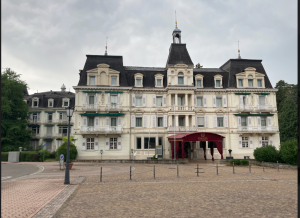
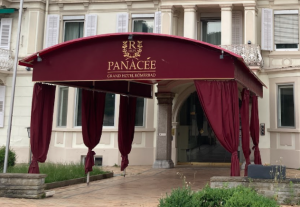
These are screen shots because it’s too hellish to get real photos in here (try it for 4 hours and then come back and report to me).
Now let’s get down to work. The hotel is both fancy and scuzzy at the same 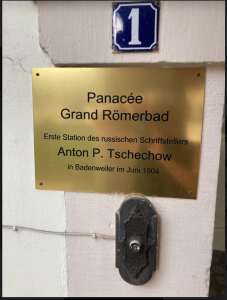 time. Not knowing German is a blessing in cases like this, because the place has been renamed to something I’ll translate the “PANACEA,” which, if enter into google, gets defined as “a solution or remedy for all difficulties or diseases.” Let us ponder this. First of all, the hotel is abandoned, supposedly (again, what option do you have but to trust my German?) to be renovated:
time. Not knowing German is a blessing in cases like this, because the place has been renamed to something I’ll translate the “PANACEA,” which, if enter into google, gets defined as “a solution or remedy for all difficulties or diseases.” Let us ponder this. First of all, the hotel is abandoned, supposedly (again, what option do you have but to trust my German?) to be renovated:
 The vacancy of the place, prevents me from any kind of contact with living human beings, but maybe the person who forced Chekhov to leave because his coughing was ANNOYING PEOPLE finds himself trapped in here, haunting the halls, tormented by remorse. Maybe something like widowed Olga in “The Grasshopper” (попрыгунья), who learned too late how famous her husband was.
The vacancy of the place, prevents me from any kind of contact with living human beings, but maybe the person who forced Chekhov to leave because his coughing was ANNOYING PEOPLE finds himself trapped in here, haunting the halls, tormented by remorse. Maybe something like widowed Olga in “The Grasshopper” (попрыгунья), who learned too late how famous her husband was.
Ольга Ивановна вспомнила всю свою жизнь с ним, от начала до конца, со всеми подробностями, и вдруг поняла, что это был в самом деле необыкновенный, редкий и, в сравнении с теми, кого она знала, великий человек. И вспомнив, как к нему относились ее покойный отец и все товарищи-врачи, она поняла, что все они видели в нем будущую знаменитость. Стены, потолок, лампа и ковер на полу замигали ей насмешливо, как бы желая сказать: «Прозевала! прозевала!
Anyway, evicted from this monstrosity, Anton and Olga went down the hill, passing the old Roman baths on the way, and a nice little park (though in the latter case it might be is back-projected) and found themselves a room at the Friedericke, about which more in a moment.

But first let’s get artsy and do a mise-en-abyme (those who are triggered by this spelling remember, please, that I am not slowing down for diacritical marks) that will let me in past these locked doors, where I can join the souls (guilty, atoning, innocent but cast out as the case may be) haunting these halls.
Who the #$%@& would call a hotel the Panacea? (again, maybe this is not at all what the word means but hey, you don’t like it, write your own blog). Maybe someone trying to purge 118 years of guilt? Notice–not only did they kick him out but they also had the nerve to put a plaque next to the door (look up and to the right for this one, not down), expressing pride that the great man stayed here. He DID stay  there, that much is true. For an extremely short time. And they get credit for it.
there, that much is true. For an extremely short time. And they get credit for it.
Compare the beautiful etched stone sign on the balcony (to the left of the nice Chekhov wall cameo) outside Chekhov’s window on the side wall of the then Hotel Sommer, now, these days, the Klinik Park-Therme, which I deduce says “Here lived Anton Chekhov, in July 1904”
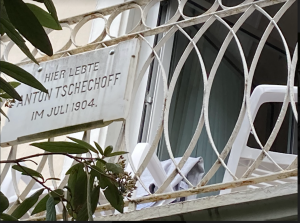 Just repeating here: “LIVED” (and then, for those concerned with precision, I actually checked this one on line, and yes, that’s what it says). Which is quite beautiful to ponder. And it was out this window that his soul flew, filling the square outside it and still living today. Which now bears his name, recognizable despite the weird German spelling:
Just repeating here: “LIVED” (and then, for those concerned with precision, I actually checked this one on line, and yes, that’s what it says). Which is quite beautiful to ponder. And it was out this window that his soul flew, filling the square outside it and still living today. Which now bears his name, recognizable despite the weird German spelling:
 Soon there was a monument (more on this later, too), and then an actual Chekhov museum, the Chekhov Salon, and then a bronze seagull just outside his window.
Soon there was a monument (more on this later, too), and then an actual Chekhov museum, the Chekhov Salon, and then a bronze seagull just outside his window.
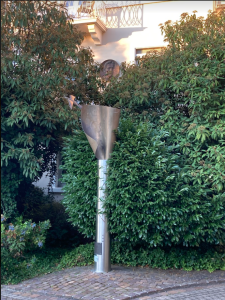
And then, the first monument, bronze, was melted down (it had to do with the war, WW I, actually, and killers needing bronze for ammunition or weapons, or whatever, or to sell; in any case this lovely little action-packed museum has an exhibit that I think is, or represents, the melted-down first Chekhov monument (deducing from the otherwise indecipherable explanation from the word Denkmal,  which I had the opportunity to learn tromping around town means “monument” and already knowing the story about it being melted down). To fill the empty place, someone made a crazy Chekhov bronze, complete with characters from his stories (look below for this one). And there’s an amazing story about ANOTHER Chekhov monument brought from SAKHALIN ISLAND here by one of the truly devoted Chekhov fans like those I have encountered on this journey, which I will tell about in the next blog post, for it is a story of heroism and martyrdom. For now, more about the museum. Somehow I thought this Tschechow Salon would be just an ordinary Literary museum with lots of writers in it, all balanced evenly, but actually this is a CHEKHOV place–with ancillary writers strewn around–Stephen Crane, some guy named Heidigger, others, too. But no doubt about it, this is his place, just one room–like him, modest, not showy, but full of content and quality. Some people planted cherry trees out front (from Taganrog, I think, so there’s a circle of birth to death, but also life being lived by the trees and by all the people walking through, and even stopping here, like me). Everything here is in German, so my brain is jumbled with it all, but the story is familiar–you can follow it in the photos displayed here, and of course because you know a lot of the story already, and supplement it by bumbling through the German inscriptions for cognates, of which there are disappointingly few. There is quite the political history here (German-Russian-Soviet-post-Soviet relations, with a conscious effort to focus on the cultural ties, which of course is also Chekhovian). It wasn’t so clear to me before in other places, but i can feel it now–that this place exists because of so many readers who appreciated Chekhov and honored him, and put in the effort to make this salon in his memory. And I am one of them too. Here is where the tears well up, because, OK, it’s Germany, he was away from home, like me, and ill, dying as everyone knew, though he carried on as though not, and all of this we behold here, the museum with its contents. And he did die here, which is why there is so much Chekhov in this town now. Otherwise, Badenweiler would have carried on its history and gone for Stephen Crane or someone more local instead. And I would never have visited. This town was for healing, though, which is what brought him here, and maybe me too. And his spirit, which flew out the window just catty-cornered to the museum, lives here.
which I had the opportunity to learn tromping around town means “monument” and already knowing the story about it being melted down). To fill the empty place, someone made a crazy Chekhov bronze, complete with characters from his stories (look below for this one). And there’s an amazing story about ANOTHER Chekhov monument brought from SAKHALIN ISLAND here by one of the truly devoted Chekhov fans like those I have encountered on this journey, which I will tell about in the next blog post, for it is a story of heroism and martyrdom. For now, more about the museum. Somehow I thought this Tschechow Salon would be just an ordinary Literary museum with lots of writers in it, all balanced evenly, but actually this is a CHEKHOV place–with ancillary writers strewn around–Stephen Crane, some guy named Heidigger, others, too. But no doubt about it, this is his place, just one room–like him, modest, not showy, but full of content and quality. Some people planted cherry trees out front (from Taganrog, I think, so there’s a circle of birth to death, but also life being lived by the trees and by all the people walking through, and even stopping here, like me). Everything here is in German, so my brain is jumbled with it all, but the story is familiar–you can follow it in the photos displayed here, and of course because you know a lot of the story already, and supplement it by bumbling through the German inscriptions for cognates, of which there are disappointingly few. There is quite the political history here (German-Russian-Soviet-post-Soviet relations, with a conscious effort to focus on the cultural ties, which of course is also Chekhovian). It wasn’t so clear to me before in other places, but i can feel it now–that this place exists because of so many readers who appreciated Chekhov and honored him, and put in the effort to make this salon in his memory. And I am one of them too. Here is where the tears well up, because, OK, it’s Germany, he was away from home, like me, and ill, dying as everyone knew, though he carried on as though not, and all of this we behold here, the museum with its contents. And he did die here, which is why there is so much Chekhov in this town now. Otherwise, Badenweiler would have carried on its history and gone for Stephen Crane or someone more local instead. And I would never have visited. This town was for healing, though, which is what brought him here, and maybe me too. And his spirit, which flew out the window just catty-cornered to the museum, lives here.








Now, just in case you’re disoriented, all the above is ONE Chekhov statue:


The face is gnarly because those are Chekhov characters in there. The statue stands just inside the doorway of the Tschechow Salon.

In my world these photos are familiar, but I have never seen them exhibited this way, from young Anton at the upper left, as at the beginning of a story, to the last Chekhov on the lower right. This fills one wall of the Chekhov Salon.
So now for a quick dip into the Hotel Sommer, aka Klinik Park-Therme. It’s an actual clinic, with a front door and a back door, both of which I try.

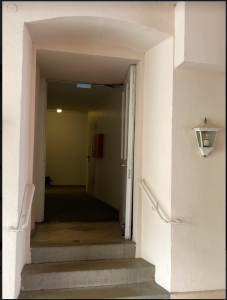
The back door (the one on the right) goes in from the little courtyard and must be the service entrance. I go around to the front door, slip on my COVID mask, for this is a clinic, and walk boldly up to the front desk, which is quite indistinguishable from a hotel reception desk, which I guess at one time it was. My German (non-existent) is a handicap, but eventually I am kicked up to a higher-level administrator, a bespectacled man, who is extremely kind and conscientious with his own rudimentary Engish-German mix. I feel the tender presence of a health-care professional. We discuss in our primitive manner Chekhov’s stay here, and whether his room can be visited, which of course it can’t, because, I am delighted and moved to learn, there are patients staying there, for this is a working clinic, whose task is healing. Do these patients know they are in Chekhov’s room? Does it matter? I am happy not to go in there, as this is itself Chekhovian in spirit–of course people come here to get well! The man tells me people come to this place and stay three weeks for rest and care. The place does not look like a clinic to me, with harsh flourescient American lights, a stark medicinal feel, sharp divisions between the sick and the well. It feels like a hotel, a place where you might go for some quiet time and vacation (if you are an older person and do not have to take your kids to mini-golf). This is a place for people, and if I were to be sick, I would beg to be brought here where I could rest, in Chekhov’s invisible room.


And now the middle place. When Chekhov and Olga left the odious Rommerbad, they alit in the Friedericke, which was later to be renamed the Park Hotel & Spa Katharina (https://www.parkhotelkatharina.de/en/hotel/history). This is the one Chekhov hotel in Badenweiler (of the three) where you can actually stay. So I did, as a required part of my pilgrimage, and not because the hotel has four stars (I have never stayed in a four-star hotel before, but duty called). The place is completely renovated so no living person can possibly know what room Olga and Anton stayed in. I’ll assume it was not too high up, so have chosen to sit for a whie in the main floor sitting room, blessedly empty today except for me and Chekhov, and looking out onto the astonishing sunsets of Badenweiler.  The internet is better here too. This afternoon I made an inquiry at the front desk, something quite banal about a towel, but in the process I realized I could ask about Chekhov’s room. So I flashed the blog, which brought on an administrator (the inquiry, not the blog). It turns out that she is Russian, and not only Russian, but a former MGU Philosophy professor, and we immediately tumble into Russian. After solving my banal towel problem we babble on about many Russian matters, from Chekhov to tragic world events, and she informs me that Chekhov left here because it was boring (as he wrote in a letter. If this blog were more scholarly I’d quote the letter here and maybe I will, later). In any case, this hotel was also renovated, but it has real people in it, mixed in with the ghosts. And here, as in all the Chekhov places, there are bits of him in the air–which is very very good for breathing, I have had some time to learn. There’s even an INHALATORIUM in town,
The internet is better here too. This afternoon I made an inquiry at the front desk, something quite banal about a towel, but in the process I realized I could ask about Chekhov’s room. So I flashed the blog, which brought on an administrator (the inquiry, not the blog). It turns out that she is Russian, and not only Russian, but a former MGU Philosophy professor, and we immediately tumble into Russian. After solving my banal towel problem we babble on about many Russian matters, from Chekhov to tragic world events, and she informs me that Chekhov left here because it was boring (as he wrote in a letter. If this blog were more scholarly I’d quote the letter here and maybe I will, later). In any case, this hotel was also renovated, but it has real people in it, mixed in with the ghosts. And here, as in all the Chekhov places, there are bits of him in the air–which is very very good for breathing, I have had some time to learn. There’s even an INHALATORIUM in town,


which I went in but still haven’t figured out what it actually is. Indeed this week I have thought of breathing quite a bit, knowing how hard it was for Chekhov to do, so much so that he came here. In this air, the conversation with the hotel administrators had the feel of something that could go on and on, and it turns out, the other hotel administrator, who is at the front desk and checked me in a few days ago, ALSO is fluent in Russian (being from Bulgaria), and if I had known this before, we would certainly have bonded. Things could have gotten quite intense, but new guests came to register (it is Friday, after all, the weekend is about to begin), and all three of us went back to our day jobs.

p.s. little touch of home: bikers in Badenweier

Leave a Reply